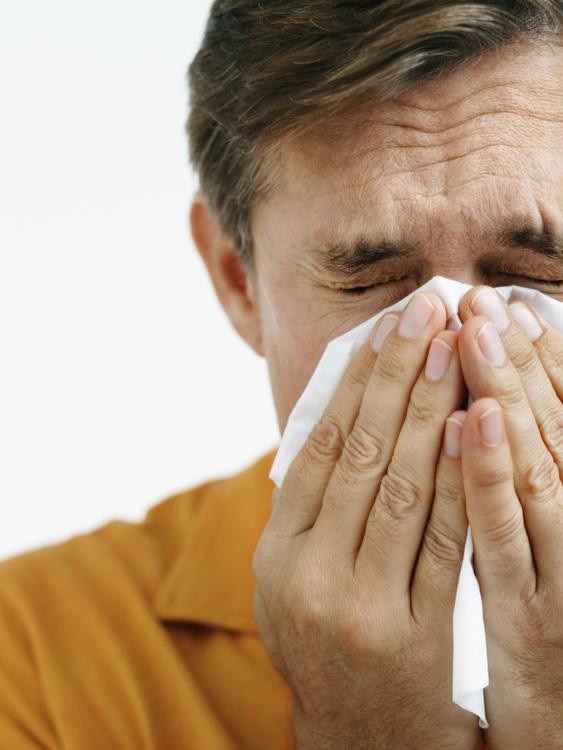Experts say Aussies facing the worst hayfever season in a decade
Itchy eyes? Sneezing? You’re not imagining it – the experts agree Aussies are suffering through a shocker hayfever season. And yes, it appears to have kicked off earlier too.
National
Don't miss out on the headlines from National. Followed categories will be added to My News.
Spring is in the air – and so are a horror level of allergens causing a “chronic background level” of symptoms that are nothing to sneeze at for hayfever sufferers.
University of Adelaide professor of Plant Systematics Michelle Waycott said wet, milder conditions at the start of this year had caused grasses to “grow and flower early” and in high volumes.
“That would mean that the grass pollen load would definitely be very high this year – definitely more so than usual,” Professor Waycott said.
“The chronic background level of hayfever will be quite bad – more people will be showing symptoms, and for a longer period.”
Professor of Ear Nose & Throat Surgery at Flinders University Dr Simon Carney said it’s been the “perfect storm” to create one of the worst hayfever seasons we’ve seen in years.
“The mild winter, not a huge amount of heat, no rain and now the increasing temperatures and winds have led to the perfect storm,” Dr Carney said.
“The huge load of fungal spores being blown from the outback and Barossa here in South Australia is also contributing . . . we have the highest fungal load of any capital.”
So will it settle?
“with everything so crazy with El Nino and (La Nina) who knows? There’s a hot, dry summer forecast . . . but we’ll have to wait and see.”
Dr Deryn Thompson, who teaches postgraduate allergy nursing at Uni SA, said “more people seemed to be reacting” with hayfever for multiple reasons, including climate change and even migration.
“We’ve got a much more diverse population now … when you move to a new country, by about the second year you are starting to get symptoms with hayfever,” Dr Thompson said.
“The third year, you are at the doctor, seeking help.”
Dr Thompson said a “diverse range” of grasses were flowering at the moment, and that olive pollen was also contributing to a bad hayfever in South Australia.

“Olive trees grow the best in SA outside of the Mediterranean, so there’s a huge olive pollen problem.”
Dry, airborne moulds and tree pollens were also making people symptomatic.
Dr Thompson said remembering to take over-the-counter antihistamines, nasal sprays and “even putting the odd bit of vaseline up your nose on a hot north windy day” could help relieve symptoms.
The melbournepollen.com.au site shows that the pollen count across Melbourne on Tuesday was “extreme” right across the board.
The Victorian Health Department had also issued warnings of a “moderate risk” for “thunderstorm asthma” for parts of Victoria.
Royal Australian College of General Practitioners state president Sian Goodson said they were seeing the spike.
“This time of year is always really bad with different plants and various allergens out there, so (with) hayfever we tend to see a spike in people complaining of symptoms,” Dr Goodson said.
Pharmacy Guild of Australia state president and national councillor Greg Scarlett said he was seeing a high number of patients and said a shocker season “wouldn’t be surprising to me given the kind of season that we’ve had”.
“We’re seeing it in my own practice,” Mr Scarlett said.
A 2020-21 survey by the Australian Bureau of Statistics found that one in five people, or 20.3 per cent, reported experiencing hayfever, while the Australasian Society of Clinical Immunology and Allergy says it affects around 18 per cent of people in Australia and New Zealand.
Allergic rhinitis is caused by the nose and eyes coming into contact with pollens from grasses, weeds or trees, dust mites, moulds and animal dander.
According to the site for allergy antihistamine product Zyrtec, in Sydney, Adelaide and Canberra grass pollen is moderate all spring, and higher as it turns to summer.
However, it says if you live in Darwin or Perth you’re going to be dealing with grass pollen nearly all year long, although it’s at its worst in the summer, and in late autumn/early winter.
Are you suffering from hayfever? Is this season a shocker? Join the conversation in the comments below


